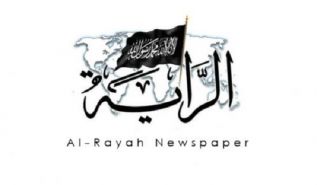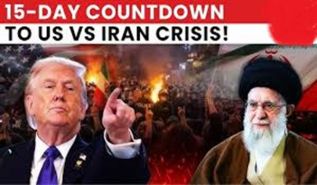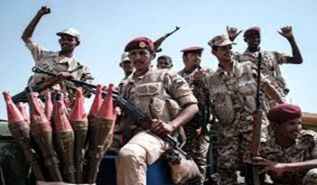بسم الله الرحمن الرحيم
From the Nile to the Dam: A Battle of an Ummah, Not a Battle of a Regime
(Translated)
Al-Rayah Newspaper - Issue 571 - 29/10/2025
By: Ustadh Mahmoud El-Leithy*
The African arena is witnessing a new escalation of tension and mutual accusations between Egypt and Ethiopia these days, against the backdrop of the wave of floods that swept through large areas in Sudan and parts of Egypt. This came with the subsequent explicit Egyptian accusations against Ethiopia of causing these floods by unilaterally operating, or emptying, the Renaissance Dam (An-Nahda Dam) without coordination, while Ethiopia rushed to deny its responsibility and consider the accusations to be “distorting claims,” stressing that the main reason is the heavy seasonal rains in the Ethiopian plateau.
Although these tensions appear on the surface to be a technical dispute or a conflict over the management of water resources, their reality is much deeper than that. They are closely linked to the international conflict in Africa, to American hegemony over decision-making in this sensitive region of the Muslim World, and to the negligence of the rulers of Egypt and Sudan in their responsibilities towards their people, and their departure from the Shariah rulings of Islam in managing their affairs.
The Grand Ethiopian Renaissance Dam (GERD) is not merely a hydroelectric project or a massive water reservoir. It is a strategic weapon in the hands of whoever controls it. With its enormous capacity of approximately 74 billion cubic meters, it can control the Nile River, the lifeblood of Egypt and Sudan. This has led experts to assert that whoever holds the power to operate and control the dam can inflict either water scarcity or flooding on Egypt and Sudan.
The dam was built with clear American support from its inception. The US sponsored the negotiations at various stages, prevented any binding international resolution against Ethiopia, and provided the political and diplomatic cover for the project to reach its final stage without Egypt or Sudan being able to halt it or impose their conditions, despite both countries being directly affected by the dam. Thus, the dam became a tool of pressure in America’s hands, used to control the behavior of the people in Egypt, Sudan, and Ethiopia, even more so than their governments, and to tighten its grip on one of the world’s most important rivers.
Anyone who follows the official stance of the three countries will clearly see that they are not acting in the interests of their people, but rather according to the dictates of the major powers, primarily the United States. While the Ethiopian regime has shown some defiance of pressure at times, it ultimately operates according to Washington’s plans and is being used to achieve its regional interests, including the encirclement and strategic weakening of Egypt by controlling its water supply.
As for the Egyptian regime, despite its public displays of discontent and angry statements, it has practically taken no serious steps, neither during the dam’s construction nor during the subsequent filling phases, nor even after its full operation. In fact, the Egyptian regime strengthened Ethiopia’s stance by agreeing to the Declaration of Principles in Khartoum in March 2015, which, for the first time, recognized the legitimacy of the dam’s construction and provided Ethiopia with the necessary legal and international cover. Egypt continues to rely on futile negotiations and international mediations sponsored by the very powers that support the dam and ensure its continued operation. This stance stems not from a lack of capabilities, but rather from complete political subservience to the United States.
As for the Sudanese regime, it has turned into an arena of international conflict, and no longer possesses a real sovereign decision, which has made it oscillate between supporting Ethiopia at times, and complaining about it at other times, without having an ideological stance or an independent political will.
Sudan has experienced widespread flooding in recent weeks, displacing thousands of families and destroying vast areas of farmland and infrastructure. Some areas in Egypt have also been affected by a sudden rise in the Nile’s water level. Egypt maintains that the flooding is a result of Ethiopia’s uncoordinated release of water from the dam, while Ethiopia attributes it to seasonal rains.
Regardless of the technical debate, the painful reality is that the decision to open or close the dam’s gates has become a sovereign Ethiopian decision subject to American influence, and can be used at any moment as a political and economic pressure tactic against Egypt and Sudan. Just as uncoordinated operation of the dam could lead to devastating floods, withholding water during droughts could trigger a major water crisis threatening millions of people.
What Egypt must do is not resort to political begging or throw itself into the arms of international mediators, but instead adopt a truly sovereign stance based on the Islamic obligation to care for the affairs of the people. This guardianship includes protecting their water and food security, and defending their vital resources by all Shariah means, not leaving them hostage to another state or major power.
The Egyptian regime must immediately halt these futile negotiations, which have only exacerbated the situation, and take concrete action to prevent any water-related threat to the people of Egypt and Sudan. Water is not a matter for negotiation; it is a matter of life and death. Furthermore, the regime must expose the insidious American interference in this matter and refuse to treat Washington as a mediator. Instead, it must recognize the US as the mastermind behind this conflict, manipulating the situation to serve its own interests, not those of the region’s people.
The radical solution cannot be achieved under these fragmented, dependent regimes. Instead, it is necessary to establish the Khilafah Rashidah (Rightly Guided Caliphate) on the Method of the Prophethood, which unifies the Muslim lands under one leadership, consolidates their resources and strength, and manages their rivers and dams in a way that serves the interests of the Ummah, not the interests of the colonialist.
Under the Khilafah (Caliphate), no other state can be permitted to seize and control a river flowing through the lands of Islam. Instead, the river is managed as public property belonging to all Muslims, and no party has the right to withhold its waters or use it for blackmail. If a foreign party or agent dares to threaten the Ummah’s source of life, the Khilafah will take whatever measures are necessary to protect the interests of Muslims, even by force, because protecting the Ummah is a Shariah obligation that cannot be compromised. The Prophet Muhammad (saw) said,
«الْمُسْلِمُونَ شُرَكَاءُ فِي ثَلَاثٍ: فِي الْمَاءِ وَالْكَلَأِ وَالنَّارِ» “Muslims are partners in three things: water, pasture, and fire.” The Nile is public property belonging to the Islamic Ummah, America has no right to control it, Ethiopia has no right to use it as a weapon, and Egypt has no right to negotiate its share of it as if it were a gift.
The real problem lies not in the walls or gates of the Grand Ethiopian Renaissance Dam, but in the regimes governing Muslim countries today. If Egypt were a sincere and independent state, one that truly implemented Islamic Shariah rulings and cared for the affairs of the Muslim World, it would never have allowed the dam to be built in the first place, nor would it have permitted the dam to become a tool of American pressure against our people.
It is the Shariah obligation upon the people of Egypt, Sudan, and the rest of the Islamic Ummah, especially its armies, to work towards establishing the Khilafah Rashidah (Rightly Guided Caliphate) on the Method of the Prophethood, which unifies the lands of the Muslims, liberates their political and economic decision-making, and restores the management of their resources in accordance with the Shariah rulings of Islam, so that these resources are used to serve the Ummah and not to threaten it.
* Member of the Media Office of Hizb ut Tahrir in Wilayah Egypt




